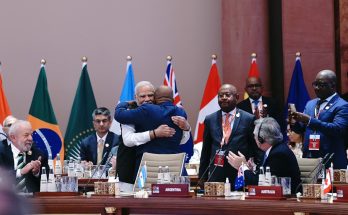“ Turning and turning in the widening gyre
Turning and turning in the widening gyre
The falcon cannot hear the falconer;
Things fall apart; the centre cannot hold;
Mere anarchy is loosed upon the world…”
(W.B. Yeats)
My romance with African Anglophone Literature began with a chance reading of Chinua Achebe’s Things Fall Apart. It transported me into a hitherto unfamiliar world of the Ibo tribe in Nigeria. The book has a magnetic charm and makes for an easy reading. Achebe is a master story-teller who can convey complex thoughts and ideologies through a seemingly uncomplicated narrative. Through Achebe I realised the magnitude and enormity of the African literature, and very soon I would find myself sailing on this journey of discovery as one after the other brilliant authors would reveal themselves and my love for this genre would be sealed for a lifetime. From the Masters such as Ngugi Wa Thiong’o, Flora Nwapa, Buchi Emecheta I would read contemporary authors such as Chimamanda Adichie, Sefi Atta and so on. The list is endless as the wisdom from Africa is endless as is the commitment and sheer brilliance of the writers from the so called “Black Continent”.
 Things Fall Apart was published in 1958, the year that seemingly ushered in the Nigerian independence from the British colonial regime in 1960. Interestingly, this was not the first Anglophone novel to be published from Nigeria, but this was the first novel to catch the fancy of the world at large and very soon it was to become the seminal novel which was to define African writing for a long time. One wonders why Achebe’s novel managed to break the global boundaries and acquired an iconic stature. There are several things which work in favour of this novel. Primarily, the narration is brilliant and it manages to keep the reader engaged right till the very end. Then it is a seemingly unbiased novel which talks of the story of the colonial incursion into Nigeria without blaming anyone but the colonial policy makers. It also locates the flaws within the Ibo society which resulted in the “things falling apart”. And yet it is the story of the proud Ibo people — a clan of warriors and farmers whose entire way of life is disrupted by colonialism. As the colonial powers make inroads into the Ibo society, the nerve of the clannish society is exposed and a way of life is forced to come to an abrupt end. Achebe moans the loss not by saying that his people were the best but by opposing Joseph Conrad’s analysis of Africa and its people as “uncivilized” and “uncultured” as seen in his widely popular novel The Heart Of Darkness.
Things Fall Apart was published in 1958, the year that seemingly ushered in the Nigerian independence from the British colonial regime in 1960. Interestingly, this was not the first Anglophone novel to be published from Nigeria, but this was the first novel to catch the fancy of the world at large and very soon it was to become the seminal novel which was to define African writing for a long time. One wonders why Achebe’s novel managed to break the global boundaries and acquired an iconic stature. There are several things which work in favour of this novel. Primarily, the narration is brilliant and it manages to keep the reader engaged right till the very end. Then it is a seemingly unbiased novel which talks of the story of the colonial incursion into Nigeria without blaming anyone but the colonial policy makers. It also locates the flaws within the Ibo society which resulted in the “things falling apart”. And yet it is the story of the proud Ibo people — a clan of warriors and farmers whose entire way of life is disrupted by colonialism. As the colonial powers make inroads into the Ibo society, the nerve of the clannish society is exposed and a way of life is forced to come to an abrupt end. Achebe moans the loss not by saying that his people were the best but by opposing Joseph Conrad’s analysis of Africa and its people as “uncivilized” and “uncultured” as seen in his widely popular novel The Heart Of Darkness.
 At the centre of the novel is the depiction of the Ibo way of life in a village called Umofia. These villages are self-dependent, relying primarily on agriculture. The planting and harvesting of yam or the king of plants determines one’s worth in the society. It is a group of people who revere hard work and prowess both in the tilling of land and in the wrestling matches. The wealth of a person is determined by his harvest and his ability to marry a new wife. The chief protagonist of the novel Okonkwo is a man doomed at birth. Unfortunately he does not have a start in life like most of his contemporaries. His father had been a “wastrel” and had not managed to leave the mandatory barn or wife to his young son. But he decides to challenge his fate and his ‘chi’ being in his favour is soon able to make a name for himself. He has three wives and many children and a barn full of yam seeds. Okonkwo is one of the important men in his clan and is invited to participate in all decision-making bodies of the village and is known in all the seven villages and beyond for his prowess in wrestling. Interestingly, though the narrative begins with the story of Okonkwo, very soon it shifts to the tales of the unfortunate Unoka, Okonkwo’s father and the young boy Ikemefuna. Unoka has a passion for music which the severely competitive and materialistic Ibo society fails to respect. Ikemefuna’s story is heart-rending. He is forced to leave his village for a fault committed by his father and is later executed on the orders of the oracle by the man who becomes his foster father – Okonkwo. Things Fall Apart is the first of the trilogy that traces the pre and post-colonial Ibo way of life.
At the centre of the novel is the depiction of the Ibo way of life in a village called Umofia. These villages are self-dependent, relying primarily on agriculture. The planting and harvesting of yam or the king of plants determines one’s worth in the society. It is a group of people who revere hard work and prowess both in the tilling of land and in the wrestling matches. The wealth of a person is determined by his harvest and his ability to marry a new wife. The chief protagonist of the novel Okonkwo is a man doomed at birth. Unfortunately he does not have a start in life like most of his contemporaries. His father had been a “wastrel” and had not managed to leave the mandatory barn or wife to his young son. But he decides to challenge his fate and his ‘chi’ being in his favour is soon able to make a name for himself. He has three wives and many children and a barn full of yam seeds. Okonkwo is one of the important men in his clan and is invited to participate in all decision-making bodies of the village and is known in all the seven villages and beyond for his prowess in wrestling. Interestingly, though the narrative begins with the story of Okonkwo, very soon it shifts to the tales of the unfortunate Unoka, Okonkwo’s father and the young boy Ikemefuna. Unoka has a passion for music which the severely competitive and materialistic Ibo society fails to respect. Ikemefuna’s story is heart-rending. He is forced to leave his village for a fault committed by his father and is later executed on the orders of the oracle by the man who becomes his foster father – Okonkwo. Things Fall Apart is the first of the trilogy that traces the pre and post-colonial Ibo way of life.
 The Ibo society depicted by Achebe is not without its fair share of evils. Twins are abandoned at birth and are left to die in the evil forest. Osus are untouchables who are not allowed to shave off their hair and are forced to bear the mark of this ostracization throughout their lives. Achebe is clear-sighted enough to report that no society in utopic and all of them are flawed to some extent. However, this does not take away from the proud world of the Ibo clan which he depicts. The novel lovingly describes the marriage rituals, the harvest festivals and the dispensing of justice by the elders of the clan which leaves the reader in no doubt that this is a society of extremely civilized and proud individuals. The colonial discourse of the pygmy-brained Black people needing to be civilized by the Whites is turned on its head. The ‘alien non- white’ world is depicted in all its glory as having access to a language peppered with proverbs which carry a world of wisdom. “Proverbs are the palm oil with which words are eaten,” says Achebe. The richness of the oral culture is depicted through the usage of proverbs such as “Our elders say that the sun will shine on those who stand before it shines on those who kneel under them.” “If a child washes his hands he could eat with kings”.
The Ibo society depicted by Achebe is not without its fair share of evils. Twins are abandoned at birth and are left to die in the evil forest. Osus are untouchables who are not allowed to shave off their hair and are forced to bear the mark of this ostracization throughout their lives. Achebe is clear-sighted enough to report that no society in utopic and all of them are flawed to some extent. However, this does not take away from the proud world of the Ibo clan which he depicts. The novel lovingly describes the marriage rituals, the harvest festivals and the dispensing of justice by the elders of the clan which leaves the reader in no doubt that this is a society of extremely civilized and proud individuals. The colonial discourse of the pygmy-brained Black people needing to be civilized by the Whites is turned on its head. The ‘alien non- white’ world is depicted in all its glory as having access to a language peppered with proverbs which carry a world of wisdom. “Proverbs are the palm oil with which words are eaten,” says Achebe. The richness of the oral culture is depicted through the usage of proverbs such as “Our elders say that the sun will shine on those who stand before it shines on those who kneel under them.” “If a child washes his hands he could eat with kings”.
Achebe has been critiqued for his portrayal of the women as the weaker sex. Okonkwo’s wives are seen kneeling before him and the youngest wife gets beaten up by him. However, in this grand scheme of patriarchy there are delightful tales of women exerting their choices. Okonkwo’s middle wife leaves her previous husband to j oin him when he wins the wrestling match. There is the figure of the Agbala or the priestess who frightens the mightiest of men. It is true that while a contemporary of Achebe Flora Nwapa paints a dominantly feminine world, Achebe’s world remains essentially male.
oin him when he wins the wrestling match. There is the figure of the Agbala or the priestess who frightens the mightiest of men. It is true that while a contemporary of Achebe Flora Nwapa paints a dominantly feminine world, Achebe’s world remains essentially male.
Things Fall Apart is a must read for the Indian reader as the Ibo world seems familiar and one can relate to the characters and the situations instantly. Also, it opens up the grand world of Africa which is a treat to all book lovers. Chinua Achebe’s masterpiece is a classic and a contemporary read – a must have on the shelves of all book lovers.
( Nandini C. Sen is a Delhi-based academic)
Nandini C. Sen is a Delhi-based academic)
Author Profile
- India Writes Network (www.indiawrites.org) is an emerging think tank and a media-publishing company focused on international affairs & the India Story. Centre for Global India Insights is the research arm of India Writes Network. To subscribe to India and the World, write to editor@indiawrites.org. A venture of TGII Media Private Limited, a leading media, publishing and consultancy company, IWN has carved a niche for balanced and exhaustive reporting and analysis of international affairs. Eminent personalities, politicians, diplomats, authors, strategy gurus and news-makers have contributed to India Writes Network, as also “India and the World,” a magazine focused on global affairs.
Latest entries
 India and the WorldJune 26, 2025Operation Sindoor: India Sheds Restraint, Rediscovers Utility of Force
India and the WorldJune 26, 2025Operation Sindoor: India Sheds Restraint, Rediscovers Utility of Force India and the WorldJune 23, 2025BRICS summit in Rio to focus on Global South, local currency trade
India and the WorldJune 23, 2025BRICS summit in Rio to focus on Global South, local currency trade Africa InsightsJune 11, 2025New Opportunities in India-Japan Cooperation in Africa
Africa InsightsJune 11, 2025New Opportunities in India-Japan Cooperation in Africa India and the WorldMay 23, 2025Post-Operation Sindoor, India reminds Turkey, China of concerns and sensitivities
India and the WorldMay 23, 2025Post-Operation Sindoor, India reminds Turkey, China of concerns and sensitivities







